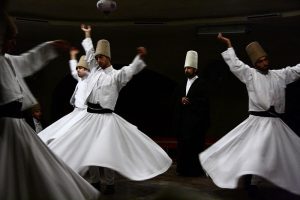 I’m loving the 1 John reading found in the Revised Common Lectionary selections for Sunday, April 29, 2018. The lections, which can be found here, include an epistolary passage that focuses on “God is Love” — a simple three-word phrase that might sum up the entire message of the New Testament. As wonderful and Christian-y as this concept is, it does show up in other traditions. The idea that God and love are one-and-the same is probably most obvious, and most poetic, in the Sufi tradition.
I’m loving the 1 John reading found in the Revised Common Lectionary selections for Sunday, April 29, 2018. The lections, which can be found here, include an epistolary passage that focuses on “God is Love” — a simple three-word phrase that might sum up the entire message of the New Testament. As wonderful and Christian-y as this concept is, it does show up in other traditions. The idea that God and love are one-and-the same is probably most obvious, and most poetic, in the Sufi tradition.
Let’s start with an excerpt of the 1 John reading.
4:7 Beloved, let us love one another, because love is from God; everyone who loves is born of God and knows God.
4:8 Whoever does not love does not know God, for God is love.
4:11 Beloved, since God loved us so much, we also ought to love one another.
4:12 No one has ever seen God; if we love one another, God lives in us, and his love is perfected in us.
4:13 By this we know that we abide in him and he in us, because he has given us of his Spirit.
4:19 We love because he first loved us.
Sufism — VERY Briefly
Sufism is often called “the mystical branch of Islam,” and like other mystical traditions, there is an underlying focus on becoming one with a God-Love that is around us, within us, and always waiting for us to connect/re-connect. Sufis are known for using ascetic practices and dhikrs (prayers and recitations) to enhance this Divine Union. The writings of the great Sufi poets, Rumi and Hafez, read like a Persian version of Song of Solomon. The Divine is frequently referred to as a “Lover,” or as “My Beloved,” and many poems come across as highly sexual, even crude, if read literally.

[Wikimedia/Schorle
(CC BY-SA 3.0)]
Rumi lived in 13th century Persia (modern-day Iran). When he died, his followers founded the Mevlevi Order, also known as the Order of the Whirling Dervishes. These dervishes practice a form of dhikr that involves twirling. Click here for a beautiful and informative video about the practice.
Coleman Barks and the Helminskis (Kabir and Camille) are popular translators of his work. Here are a few short passages/poems that mesh well with the lectionary reading from 1 John.
Gamble Everything for Love (from The Essential Rumi by Barks, Harper One, 2004)
Gamble everything for love, if you’re a true human being.
If not, leave this gathering.
Half-heartedness doesn’t reach into majesty. You set out to find God, but then you keep stopping for long periods at mean-spirited roadhouses.
Rubaiyat 1246 (from The Pocket Rumi, Edited by K. Helminski, Shambhala, 2008)
The moment I first heard of love I gave up my soul, my heart, and my eyes.
I wondered, could it be that the lover and the beloved are two?
No, they have always been one.
It is I who have been seeing double.
Your Bread is Seeking You (Mathnawi V, 2851 from The Pocket Rumi, Shambhala, 2008)
Listen, put trust in God, don’t let your hands and feet tremble with fear: your daily bread is more in love with you, than you with it.
Excerpt from Tending Two Shops (from The Essential Rumi by Barks, Harper One, 2004)
The only real rest comes when you’re alone with God.
Live in the nowhere that you came from, even though you have an address here.
Hafez (also Hafiz)
Hafez lived in the 14th century. His name means “guardian” or “memorizer” and refers to reports that he memorized the entire Qur’an at a very young age. He could also recite Rumi, as well as the poetry of other great Sufi mystics. Daniel Ladinsky is a well-known translator of his work. Here are few of my favorites Hafez poems about love.
The Subject Tonight is Love (from The Subject Tonight is Love, Penguin Compass, 1996)
The subject tonight is Love and for tomorrow night as well,
As a matter of fact I know of no better topic for us to discuss until we all die!
The Sun Never Says (from The Gift, Penguin Compass, 1999)
Even after all this time the sun never says to the earth, “You owe Me.”
Look what happens with a love like that,
It lights the Whole Sky.
Excerpt from The Guardians of His Beauty (from The Subject Tonight is Love)
We are the guardians of His Beauty.
We are the protectors of the Sun.
There is only one reason we followed God into this world:
To encourage laughter, freedom, dance, and love.
Enjoy this Sunday’s Love fest! It’s a great follow-up to Earth Day!
Multifaith Mashup provides passages from the writings/sacred texts of other faith traditions that match an excerpt from the Biblical lections offered in the Revised Common Lectionary. Multifaith Mashup is published on Tuesdays and focuses on the lectionary readings for the upcoming Sunday. Questions? Contact us at vicki@worldreligions4kids.com.